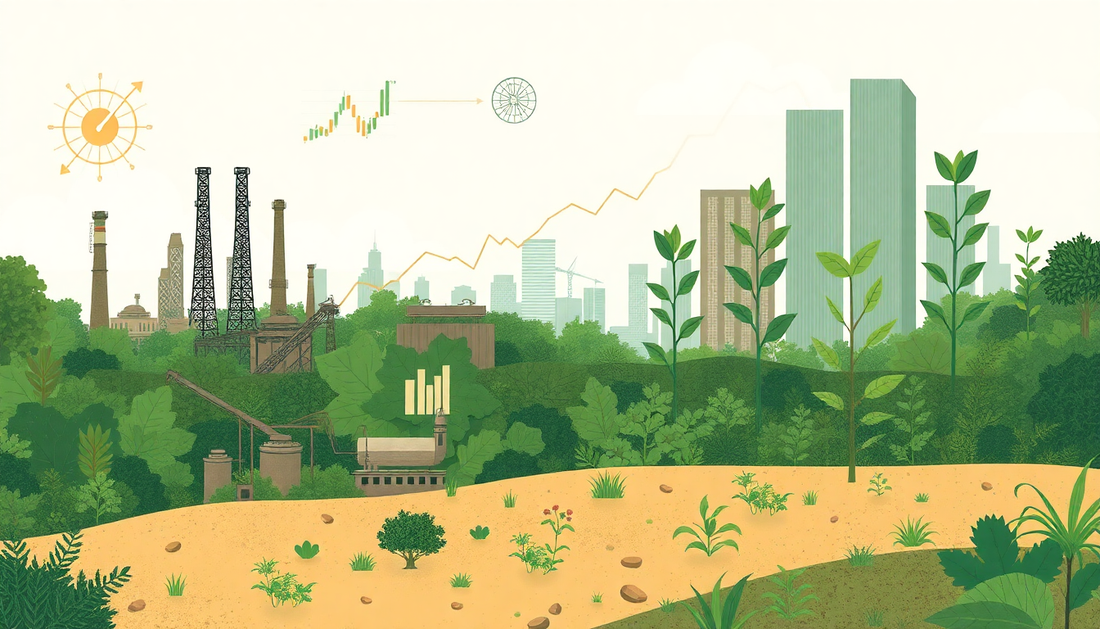In a world grappling with the devastating effects of climate change, environmental degradation, and resource depletion, the concept of "degrowth" has emerged as a potential solution to these pressing issues. Degrowth is a philosophical and economic approach that challenges the traditional notion of endless economic growth, proposing instead a shift towards a more sustainable and equitable model of development.
Understanding Degrowth
At its core, degrowth is a rejection of the idea that perpetual growth is both possible and desirable. Instead, it advocates for a voluntary reduction in production and consumption, with the ultimate goal of achieving a more balanced and harmonious relationship between human societies and the natural environment.
The key principles of degrowth include:
- Prioritizing well-being over material accumulation: Degrowth emphasizes the importance of focusing on quality of life, social and environmental justice, and the equitable distribution of resources, rather than solely pursuing economic expansion.
- Reducing resource consumption and waste: Degrowth calls for a significant decrease in the extraction and use of natural resources, as well as a reduction in the generation of waste and pollution.
- Promoting local, community-based economies: Degrowth advocates for the development of decentralized, community-oriented economic models that prioritize local production, distribution, and consumption.
- Fostering a culture of sufficiency: Degrowth encourages a shift in societal values, where individuals and communities embrace a mindset of "enough" rather than constantly striving for more.
Environmental Benefits of Degrowth
The potential environmental benefits of adopting a degrowth approach are numerous and far-reaching. By reducing resource consumption and waste, degrowth can lead to:
- Lower carbon emissions: With a decrease in production and consumption, the associated greenhouse gas emissions would also decline, contributing to the fight against climate change.
- Preservation of natural ecosystems: Reduced resource extraction and land use would help to protect and restore natural habitats, preserving biodiversity and the overall health of the planet's ecosystems.
- Improved resource efficiency: Degrowth encourages the development of more sustainable and circular economic models, where materials are reused, recycled, and repurposed, reducing the need for new resource extraction.
- Reduced pollution and environmental degradation: Decreased industrial activity and consumption would lead to a decline in the generation of waste, toxic substances, and other forms of pollution, improving air, water, and soil quality.
Practical Applications of Degrowth
Implementing degrowth in practice requires a multifaceted approach, involving changes at both the individual and societal levels. Some practical applications of degrowth include:
- Sustainable lifestyle choices: Individuals can adopt more sustainable consumption patterns, such as reducing waste, embracing a plant-based diet, and minimizing the use of fossil-fuel-powered transportation.
- Community-based economic models: Local communities can develop alternative economic systems, such as cooperatives, time banks, and local currency schemes, that prioritize social and environmental well-being over profit maximization.
- Shifting work-life balance: Degrowth advocates for a reduction in working hours and a greater emphasis on leisure, community engagement, and personal development, rather than constant productivity.
- Investing in renewable energy and green infrastructure: Governments and businesses can redirect resources towards the development of renewable energy sources, energy-efficient technologies, and sustainable infrastructure, reducing the reliance on fossil fuels.
Challenges and Criticisms
While the potential benefits of degrowth are compelling, the concept is not without its challenges and criticisms. Some of the key issues include:
- Resistance from traditional economic models: Degrowth represents a significant departure from the dominant economic paradigm, which is heavily invested in the pursuit of growth. This can lead to resistance from policymakers, businesses, and individuals who are accustomed to the current system.
- Implementation barriers: Transitioning to a degrowth-oriented society requires coordinated efforts across multiple sectors, which can be logistically and politically challenging to achieve.
- Concerns about economic stability and employment: Some argue that a reduction in economic activity could lead to job losses and financial instability, particularly for those already struggling.
- Counterarguments and skepticism: Critics of degrowth argue that it is an unrealistic and even regressive approach, and that technological innovations and efficiency improvements can address environmental concerns without the need for a radical shift in economic models.
Case Studies and Real-World Examples
Despite the challenges, there are already examples of successful degrowth initiatives around the world. For instance, the town of Transition Town Totnes in the UK has implemented a range of community-based projects, such as local food production, renewable energy cooperatives, and skill-sharing networks, that have helped to reduce the town's environmental footprint.
Similarly, the city of Ghent in Belgium has implemented a "Transition Plan" that aims to reduce the city's carbon emissions by 80% by 2050, through measures such as promoting sustainable mobility, supporting local businesses, and encouraging citizens to adopt more eco-friendly lifestyles.
Conclusion
As the world grapples with the urgent need to address environmental crises, the concept of degrowth offers a compelling alternative to the traditional growth-based economic model. By prioritizing well-being, reducing resource consumption, and fostering community-oriented economic systems, degrowth has the potential to help us build a more sustainable and equitable future.
While the path towards a degrowth-oriented society is not without its challenges, the potential environmental benefits are too significant to ignore. By embracing the principles of degrowth and taking action at both the individual and collective levels, we can work towards a more harmonious relationship between human societies and the natural world, and create a better future for generations to come.

